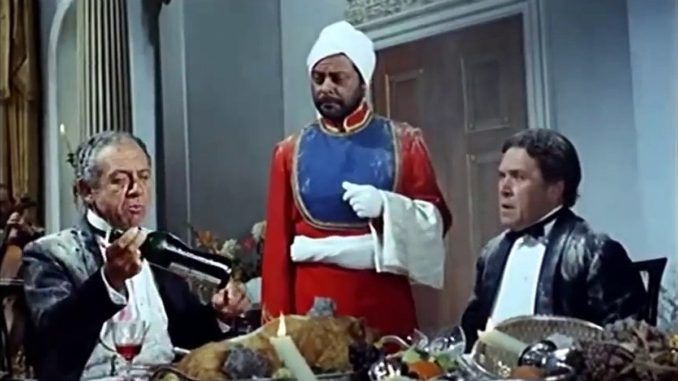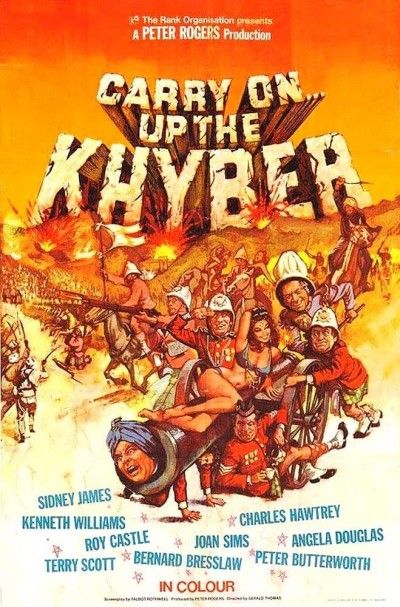
Rating: B-
Dir: Gerald Thomas
Star: Sidney James, Kenneth Williams, Charles Hawtrey, Joan Sims
This is often regarded as the greatest Carry On of the franchise: for example, it made the BFI’s list of the all-time top 100 British films in 1999. For me, it doesn’t quite reach the very highest tier, perhaps because it feels like it has a better set-up than execution. Still solid stuff, no question, and one sequence which is certainly an unquestioned classic. There’s perhaps more social satire than usual, with the stiff upper-lips of the British aristocracy ruthlessly mocked – though nobody on either side is spared, which helps counter the contemporarily awkward lack of any Asian actors at all. For as the title suggests, it’s a return to the period pieces popular since the switch to Rank, taking place in the Indian Raj, at the tail end of the 19th century. Well, theoretically in India. In reality, the Snowdon National Park stood in for the Khyber Pass – still the furthest the makers had travelled to that point.
Sir Sidney Ruff-Diamond (James) and his low-born wife Joan (Sims) are in charge of the province of Kalabar, which includes the Khyber pass, and must defend it from the anti-Empire forces of the Khasi of Kalabar (Williams) and tribal leader Bungdit Din (Bernard Bresslaw, in habitual brownface). The locals are fearful of the Scottish regiment, the 3rd Foot and Mouth, known as the “devils in skirts” – in particular, fearful of their testicles. But when one of them, Private Widdle (Hawtrey), is found to be wearing woolen underpants, rather than going commando, the reputation of the soldiers is no longer a barrier. Ruff-Diamond’s efforts at diplomacy fail to calm things down, leading Din to launch an all-out assault on the governor’s mansion.
 Brownface aside, it has been one of the more controversial titles since its release, when the censors insisted on the line “Fakir, off!” being cut before release. Since then, a TV screening during the first Gulf War was replaced with a less inflammatory entry, and as recently as 2020, ITV4 cut Din’s line, “That’ll teach them to ban turbans on the buses!” Never mind it making little or no sense now, being a reference to a conflict not long before the original time of release in Wolverhampton, over whether Sikh bus conductors could wear their religious head covering.
Brownface aside, it has been one of the more controversial titles since its release, when the censors insisted on the line “Fakir, off!” being cut before release. Since then, a TV screening during the first Gulf War was replaced with a less inflammatory entry, and as recently as 2020, ITV4 cut Din’s line, “That’ll teach them to ban turbans on the buses!” Never mind it making little or no sense now, being a reference to a conflict not long before the original time of release in Wolverhampton, over whether Sikh bus conductors could wear their religious head covering.
I wouldn’t say there’s too much else of note here. The Ruff-Diamonds are great characters, yet there are few lines to cherish, except for Sidney’s rejoinder to the Khasi’s greeting of “may his radiance light up your life,” with “And up yours.” However, there is that glorious sequence mentioned, where their dinner party (top) proceeds uninterrupted during Din’s ferocious bombardment, with only visiting missionary Brother Belcher (Peter Butterworth) paying the slightest attention. He gets steadily more hysterical at his colleagues’ stoic indifference as the attack escalates, eventually reduced to playing an imaginary flute and burbling, “Strawberry mousse! Strawberry moooooousse!” As both a celebration and critique of upper-class attitudes, it may never be beaten.
